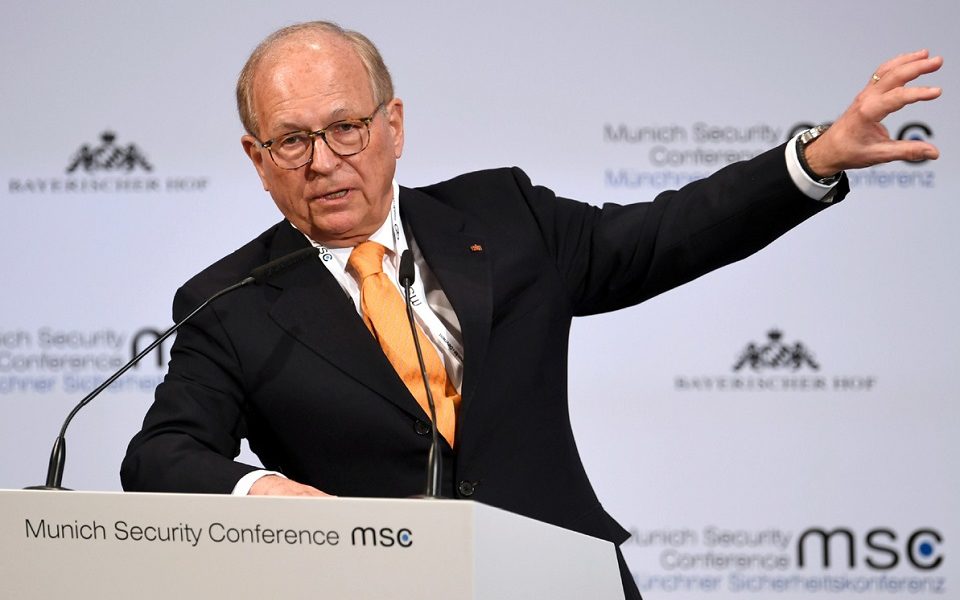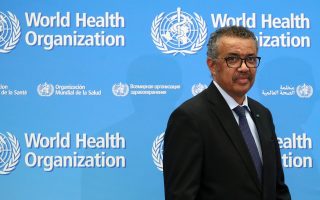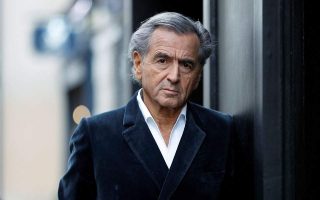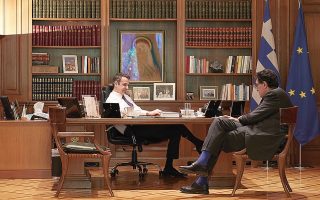NATO remains key to security, Ischinger tells Kathimerini

Ambassador Wolfgang Ischinger is one of the leading European experts on international affairs and security matters. He is also the chairman of the Munich Security Conference, the prestigious forum where foreign policy and defense leaders gather annually to discuss current global affairs.
In an interview with Kathimerini, Ischinger expresses concern over the future of democracy and explains his views on the geopolitical consequences of the coronavirus crisis. He also responds to questions about the future of the European project and the potential for dramatic changes in its structure, led by Germany and France.
Ambassador Ischinger, who is considered a pre-eminent “wise man” on such issues, also talks about China and the possibility of a new cold war.
What do you think the geopolitical consequences of the current crisis will be?
In a fundamental sense I think there have been two perspectives presented on the spectrum of possible outcomes. One is that after this pandemic nothing will be as things were before, everything will change. At the other end of the spectrum we have the school of thought which – and this I think is what most governments are trying to do – is to go back to normal life, like life was before the crisis as quickly as possible. My view is somewhere in between. I think that this crisis has a tendency of accelerating and accentuating tendencies and trends that already existed before the crisis broke out – positive and negative. Unfortunately, the negative trends are more numerous than the positive trends because before the crisis broke out at the Munich Security Conference in February, when we were already at the beginning of this pandemic in China and elsewhere, we were lamenting, with good reason, about the fragmentation of the international system, about the global international order, the liberal international order falling apart, about a crisis in transatlantic relations, about a crisis in the European Union – when you think of Brexit and when you think about current issues with Poland and Hungary in terms of rule of law – etc, etc. In other words, a crisis of the international order, a crisis of transatlantic relations, a crisis of the European Union. My biggest concern is the crisis of democracy because I think that there is a strong attempt by some countries in the EU but of course also globally to suppress the opposition, to introduce more and more authoritarian rules of conduct, to impose restrictions which are not really mandated by necessary health crises, regulations etc. So, I would say that there is also a crisis and a huge challenge for democracy and needless to say, all of these things taken together would actually require a leadership power to take things into their hands, to lead the way, to show how to deal with it. Traditionally we would have all thought that our big lead nation in NATO, the US, would lead the way through the crisis and out of the crisis. Now, unfortunately, the US and Donald Trump’s administration has no intention and has not shown any interest or any ability to lead through this crisis. It is one of the countries with the worst track record so far and that means that we the European Union need to acknowledge that, as we look at these different elements of the crisis, we are on our own largely and we need to get our act together in a very fundamental way. I am not optimistic enough to say that this is also the hour of Europe and I think we need to make an effort to demonstrate that the EU is capable and willing to meet the challenges that I just tried to outline, as a European Union.
Is this decoupling between Europe and the US something that can be reversed? Will this depend on the outcome of the US election or is it something that will stay with us forever?
I wish I could have a more positive view, but I think it is an illusion to believe that all it takes is the election of Joe Biden and then we’re back to the US being the hegemon, leading European allies, protecting Europe at huge cost for the US taxpayer etc. I think those days are probably over anyway, and the Trump administration’s behavior in the crisis is only accelerating this. I think the relationship, hopefully, will be a very good and a very close one, but it will definitely need to be a relationship where we Europeans take a greater share of the burden, not only of course in terms of military expenditure – that is only the one obvious example – but also in terms of, for example, the Middle East or dealing with the fallout of the crisis in Africa. If the US is not about to step in and lead initiatives, we will need to at least try to do that on our own. So, I think that the transatlantic relationship is not going to go back to what it used to be… but hopefully we will have a return to a trustful, close relationship. We need the US, we need NATO. I do not belong to the school of thought that believes that we can get rid of deterrence and the NATO protection, and without the US there is no way that at this moment we in the EU could militarily protect ourselves against all possible threats, including nuclear ones.
China looms large in this strategic landscape, especially now. Is there any chance that this could unite Europe and the US in some way, or do you think we will go our separate ways?
I think you are pointing to a question and to a challenge which will probably be the dominant policy challenge for the EU and for the transatlantic relationship. Now, I think we need to be clear about who is our partner and what are the challenges. Our traditional partner is the US. In other words, the question is how can we operate and coordinate with the US as we deal with the growing importance but also powerfulness of China in the world and of Chinese foreign policy in particular, which is becoming more – I hate to use the word aggressive, that is a very strong word – but more forceful certainly, in recent years and months, and also in the crisis.
Now, the problem here is that we in the EU do not have a China strategy. The EU Commission a year ago presented a paper on China which described China as a systemic rival, which I think is correct. I think we need an EU strategy on China, because only if we have clarity on what our policy should be as members of the EU can we start discussing how to coordinate and cooperate with the US. At the moment we have a French policy on China, a German policy on China, maybe a Greek policy on China, and China has no problem dividing us up just as Russia has successfully tried to do with European member-countries that were not united, that did not have a clear strategy. And let me add one point: In my view it should not be the objective of an EU-China strategy to describe a permanently confrontational situation between Europe and China. I think our goal should try to be to establish a level playing field – that is what the forthcoming German EU presidency will try to move forward – on such issues as investment rules etc, whereas the current US policy on China is a policy that describes a conflict. I think we will need to discuss in detail over coming years how this rather significant gap can be bridged between America that looks at China as a zero-sum game – either China wins or America wins – and Europe that looks at China as a competitor with whom we would like to establish or continue to have a cooperative relationship, but with clear rules established so that we cannot be split apart by the future global power, China.
Are you worried that the US may pose the dilemma that “either you are with us in this new cold war or we won’t extend the security guarantees that we currently do”?
I don’t think that we will get to that point but of course I would expect the US to send to us the Europeans the question “Are you with us or are you against us?” And to say, “For us in America China is a huge problem and therefore we expect you to be with us.” But that is the problem of all alliances. I think 450 million Europeans cannot be expected to simply follow 350 million Americans in this confrontational approach to China. We need to figure it out and work it out and I would even go as far as saying that we need a new form of negotiation with the US on China, because I don’t think that NATO can be the appropriate place for all these issues and the classic EU-US dialogue maybe is not sufficient. So maybe new forms of coordination between the 27 member-states and the EU itself and the US need to be discussed and found. This is not going to be a problem which will go away quickly. I think this is going to be just as long-term a challenge for the relationship as was the Soviet Union during the cold war.
You mentioned the need for leadership on the European side. We have French President Emmanuel Macron, who talks the talk and is more than a think-tank person sometimes when he talks, and we also have German Chancellor Angela Merkel, who is not very big on strategic vision. Where is leadership going to come from in Europe?
Well, let me offer a political, almost philosophical response to your question. The EU has for the last five, six or more decades been built as a European Union which regulates – regulates our behavior, our trade inside, our agriculture, our standards, even our legal standards etc. It looks inside and deals with questions among the members. I think that as I look at the future of the global situation and the current challenges, including the pandemic, I think the EU needs to prioritize and needs to adapt to emerging challenges. It needs to do what Emmanuel Macron proposed three years ago, namely we need to develop an EU which protects, so that is an EU which deals with external threats and challenges and not only the domestic inside issues. In order to take such a step, this requires a number of decisions. For example, I think the time has come for the EU to move urgently in terms of foreign policy decision-making from consensus to majority voting. We need to be able to speak with one voice. It is not good enough for the EU to allow each member-state, whether it’s Greece or Germany or Estonia, to have a veto on every single little issue, which of course explains why, on so many issues of international concern, the EU isn’t capable of having a view – because somebody has a problem with something. So, we need to create the conditions for an EU that can play a role in the international concert which is not going to be a happy concert because we lack a powerful UN Security Council, we lack accepted and legitimate international bodies and we see an increasing conflict among great powers. And if the EU wants to be able to survive and defend its interests in this increasing conflict situation, global conflict situation, we need to be able to speak with one voice.
Do you see a realistic chance of that happening?
I see a realistic chance of a process in that direction beginning. It should begin now. Look at my own country, Germany. Chancellor Merkel, but also the coalition partner, the Social Democratic Party, and other parties in the German Parliament, have spoken in favor of majority voting in the EU. Many of the members of the European Parliament, large groups, have spoken out in favor of this, so it’s not true that there is no support for this kind of idea. There is also strong opposition in a number of member-countries, that is true, but there was strong opposition when we started to create the agricultural market, half a century ago. So let’s start the process. I see a good chance that Germany and France and a few other countries can help start the process towards an EU which protects, and that means not only protecting against military threats, but it means protecting against pandemics.
Why does the EU have no competence in health coordination? It is ridiculous that each and every member-state has its own rules. Why did we have such a big problem organizing and closing borders and not closing borders etc? It’s been a mess in the initial weeks of crisis inside the EU. That’s not the fault of the EU in my view, but it’s a sign of the lack of EU competence and capacity. So, we need to empower the European Commission and the powers of EU to coordinate these kinds of threats, whether it’s migration, whether it’s transborder crime, whether it’s terrorism, or if it is in fact classic security in military threats. So that, in my view, is the way forward for the EU, if we want to reattract the European voter to the European project. I think the European voter would like to see an EU which accepts and acknowledges as part of the solution to these threats, to our lives, to our prosperity, another part of the problem, he wants the EU to be the problem solver and not the problem maker.
The European project
Given the current friction between the South and the North and the need for transfer payments to deal with the crisis and all that, are you optimistic about the future of the European project?
I am very optimistic about the European project as there is absolutely no alternative to it. I strongly believe in its ability to survive and to reform. This is always difficult and, as we say in German, “two steps forwards and one step back.” It’s not a fluid process, but that’s normal. We have 27 member-countries, maybe some more in the future if we go forward with the Balkan enlargement processes, which I hope we will do. I am very optimistic about the European project and I can tell you that there is some data that the German population remains largely pro-European – more than two-thirds. So, you have a very strong pro-European fundamental positioning. And I think that is true in a number of other member-states also. What I think we have not done well enough in the crisis – also in the Greek financial crisis a decade ago – what we have not succeeded well enough [in doing] is including the psychological elements, the empathy issue. I, for example, thought 10 years ago that it would have been a great idea if the German chancellor or the German president or the president of the German Parliament traveled to Athens and spoke in the Greek Parliament, to the Greek population, and explained our empathy and our solidarity in trying to move through the crisis together. I think that element was lacking in the crisis a decade ago and I am afraid to say I see a little bit of that repeating itself in this crisis. I wonder why did we – we the North, we the Germans – not send senior representatives, for example to Italy or to Spain, when there was big suffering in early April with many thousands of people dying, to express our solidarity, our partnership. I think this political, psychological element of empathy is something which sometimes we tend to overlook, as we tend to look at the EU as a technical arrangement, as a machine. It is a machine, but it is also people and voters and politics, and that needs inspiration. So, where are the inspiring ideas? That, and ways to solidarity, need to be brought home to the voter.
Strategic patience
I want to ask about Turkey. Turkey is a big challenge for us here in Greece but also for Europe and the West. Do you see Turkey drifting further away from the West, and what’s the best way to deal with it at this point?
Having been in this business now for more than 40 years, I am asked these types of questions also when we look at the US, “What about Trump?” or “What about Putin?” etc. My answer is that Turkey is more than President [Recep Tayyip] Erdogan. The US is more than President Trump. There was a president before Trump, there will be one after – next January or in four years. There will be somebody following Vladimir Putin – we don’t know whether that is good news or bad news. So, let’s think of Turkey not only in terms of the behavior of the policies of the current president. Let’s think of Turkey as a hugely important neighbor, as a member of NATO with Greece and all of us and as a country that has a rather deep association with Europe. I think it would be a big mistake to look at the Turkish challenges as short-term challenges. I think we need strategic patience with Turkey. Let’s wait the crisis out, let’s wait and see what comes out of Turkey. I am not convinced that Turkey will forever leave the West and embark on its own course. I don’t think that is a good idea for Turkey, I don’t think it would be successful and I think that many of my Turkish friends understand exactly that the advantages that Turkey can and will and must be able to enjoy associated with the EU and as a member of our military alliance. So, don’t give up on Turkey. Demonstrate some strategic patience. Of course we also need to have a critical dialogue with Turkey, of course on other issues that are urgent, including challenges to democracy and the rule of law in Turkey, just like in other countries we are working with, inside and outside the EU.
This is a big security challenge for Greece. In the old days we used to look to the US for some sort of protection in times of crisis. Who would you suggest Greece should look to in terms of the Turkish challenge right now?
I think the US has not given up its leadership in NATO, and I think Turkey is not about to give up its membership in NATO. So, I think if I were a Greek political leader or senior Greek diplomat, I would look to the leadership of NATO, I would look to the US, I would look to other important member-countries, like the UK, Germany and France, and others. I would also, by the way, invite Greece to be a strong advocate of a stronger European self-defense effort, not to replace NATO but to add an additional layer, an additional component. The Treaty of Lisbon establishes a solidarity clause in Article 42, which most of us have not read or not taken note of, but it’s right there. The legal basis is there for us to protect each other and demonstrate solidarity even in a security and military crisis. Building on that, creating a European defense component that would strengthen the transatlantic relationship and would strengthen our internal creation from my point of view, that would only be beneficial to Greece.





